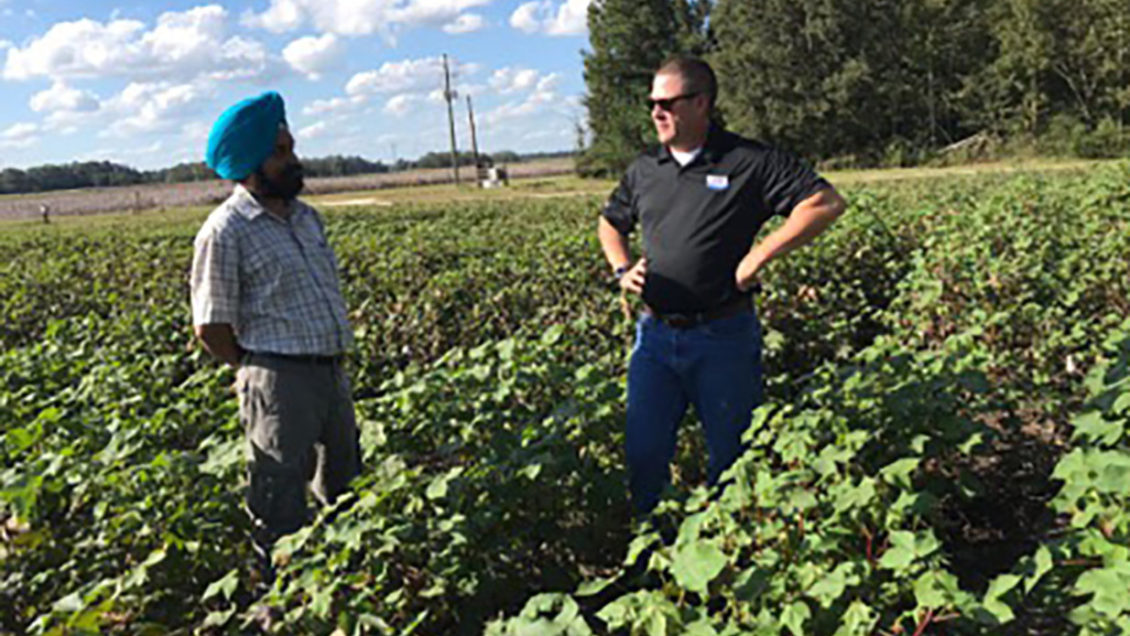BLACKVILLE — South Carolina cotton farmers may one day know exactly how much nitrogen their crops need to produce higher yields with greater quality.

Armed with this knowledge, farmers can reduce costs and help protect the environment.
Bhupinder Farmaha, a soil fertility specialist at Clemson’s Edisto Research and Education Center in Blackville, has received funding from Koch Agronomic Services and the South Carolina Cotton Board to evaluate nitrogen management strategies to optimize cotton yields on non-irrigated fields across different soil types and cropping systems in the state. This study came about after cotton farmers raised concerns about using nitrogen enhanced efficiency fertilizers (EEFs) — management tools used to prevent nitrogen loss and increase nitrogen use efficiency.
“Nitrogen is one of the most important, yet most difficult to manage fertilizers used on cotton,” Farmaha said. “Farmers had several questions about using nitrogen enhanced efficiency fertilizers. They are interested to know if these fertilizers will work in their fields. There just wasn’t any data to determine what nitrogen enhanced efficiency fertilizers work best in South Carolina so we are doing this study to find out.”
Effective nitrogen rates are difficult to manage because they are determined by the interaction of many factors: soil type, tillage, rainfall and irrigation, temperature, sunlight, length of season, insect and weed control, as well as other management practices. The optimum nitrogen rate likely differs each year and is often dependent on unpredictable factors, such as the amount of rainfall and length of season.
“Reduced nitrogen can limit the number of nodes, fruit retention, yield potential and fiber quality of cotton,” Farmaha said. “Too much nitrogen can delay maturity, cause boll rot or excessive vegetative growth, lower fiber quality, increase pest problems, as well as pollute ground and surface water.”
Nitrogen applied to crops can be lost via leaching, converting to an atmospheric gas or becoming trapped in the soil and unavailable for plant use.
To help determine the best nitrogen enhanced efficiency fertilizers for South Carolina soils, Farmaha and his team will look at the interactions of genetics, plant management and the environment. Urea is the nitrogen source used for this study. It is an inexpensive form of nitrogen fertilizer widely used by the agricultural industry.
From this study, Farmaha hopes to provide cotton farmers with information related to the amount of nitrogen needed to produce more profitable crops, while preserving the environment and saving money.
Cotton is one of the top four crops grown in South Carolina. According to the United States Department of Agriculture’s National Agricultural Statistics Service, a total of 250,000 acres of cotton were planted in South Carolina in 2017. Soybeans was the top crop planted in South Carolina in 2017, with 400,000 acres planted. Corn came in second with 350,000 acres planted and peanuts reported 122,000 acres planted in 2017.
Farmaha ran this same study on corn at Edisto REC in 2018. Preliminary results of this study show using nitrogen enhanced efficiency fertilizers allow for less nitrogen to be used, all while preserving yields and protecting the environment. He is planning to continue with nitrogen enhanced efficiency fertilizer trials before he releases recommendations for growers.
END
This project is supported by funding through a Research Trial Financial Support Agreement from Koch Agronomic Services and the South Carolina Cotton Board Grant No. 2018-001-137. The content is solely the responsibility of the authors and does not necessarily represent official views of Koch Agronomic Services nor the South Carolina Cotton Board.
Get in touch and we will connect you with the author or another expert.
Or email us at news@clemson.edu

